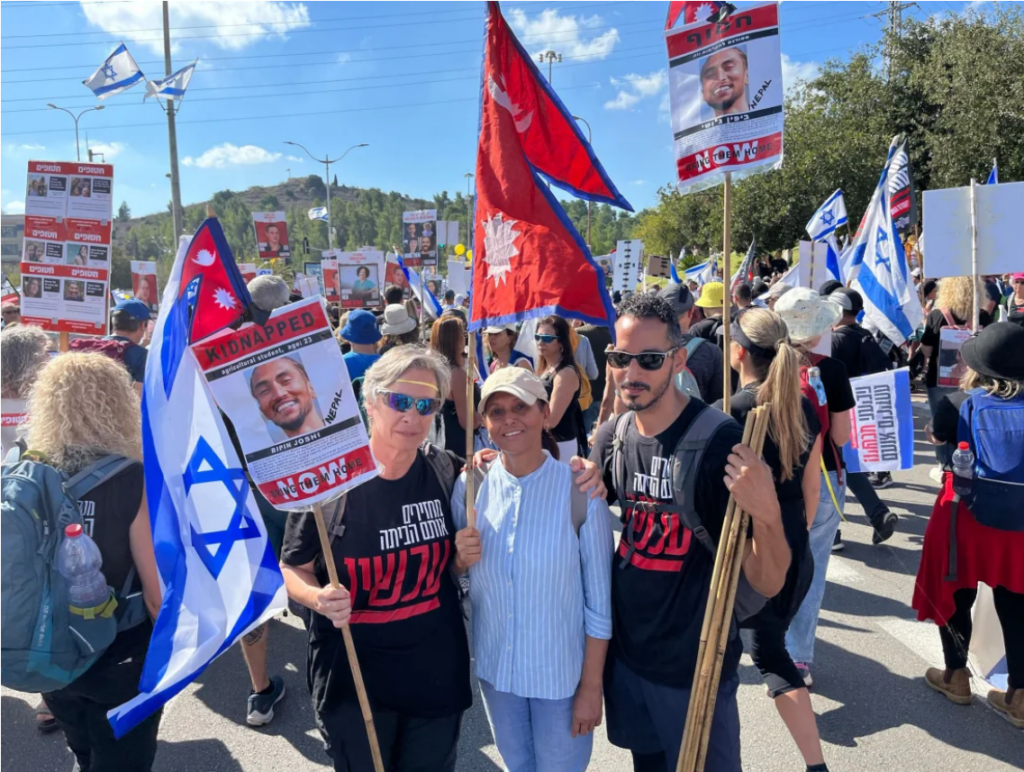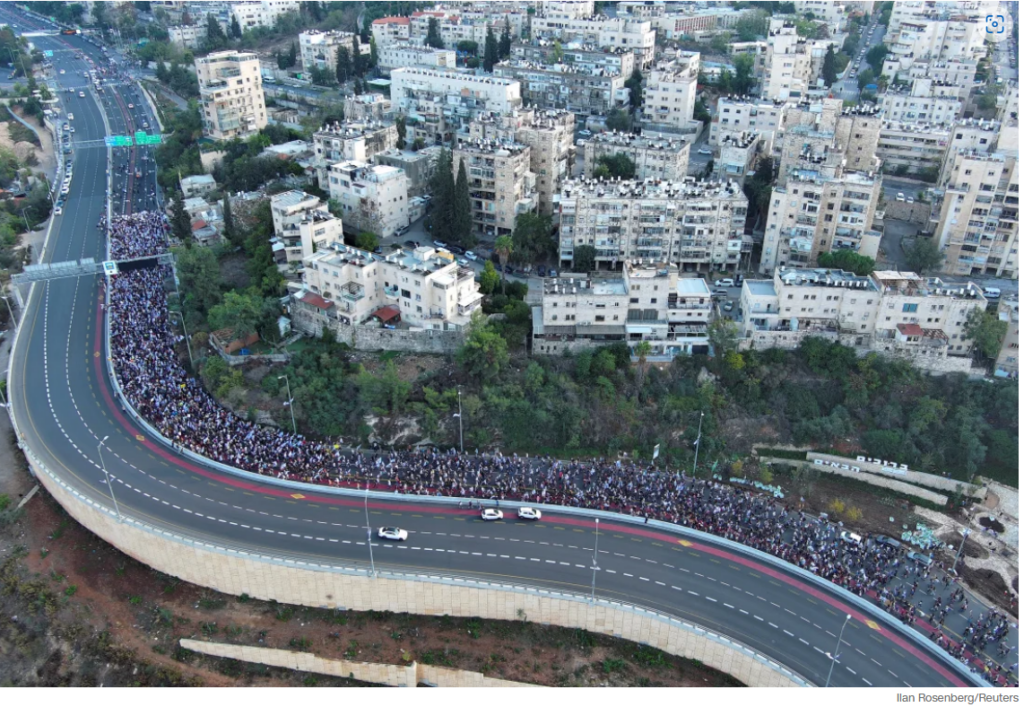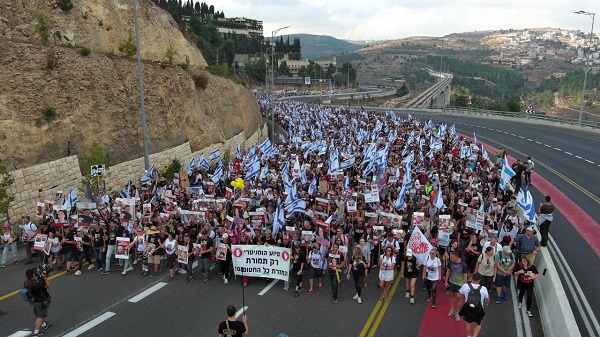Waving Israeli flags, with posters of hostages draped on their backs, families of Gaza hostages and thousands of their supporters walked through the foothills of Jerusalem and towards the residence of Israel’s Prime Minister Benjamin Netanyahu, whose government many of them blame for the fate of their loved ones.
The march began five days ago in Tel Aviv as an effort to pressure Netanyahu and his government to prioritize the safe return of the nearly 240 people kidnapped by Hamas during its murderous October 7 attack on Israel.
Only a small handful of families have met with the Israeli leader since the attacks, infuriating the hundreds of other relatives. “We want him to come and meet us… and do the right thing,” Gil Dickmann, whose cousin Carmel Gat was abducted, told CNN.
Freeing hostages should be at the top of the Israeli war cabinet’s agenda, he said. “Right now, in Netanyahu’s current political situation, this could be a real victory for the state of Israel, for the people of Israel, and for Netanyahu personally,” he added.
Winds have been shifting against the prime minister as Israel’s war in Gaza drags past its sixth week. Multiple opinion polls suggest national favor toward Netanyahu and his governing coalition is collapsing, despite continued overwhelming support in Israel for the war on Hamas, the militant Palestinian group that controls Gaza.#

Cracks emerge
Opposition parties initially rallied behind Israel’s war effort, with National Unity Party leader Benny Gantz joining the wartime government – but cracks have begun to emerge.
Ad Feedback
On Wednesday, the country’s opposition leader Yair Lapid said it was time for the six-term prime minister to resign, and called for Netanyahu’s Likud party to oust him. But Lapid did not go as far as to call for new elections, saying instead that Likud should put forward an alternative leader.
“We cannot allow ourselves to have a prime minister who has lost the public’s trust, whether from a social or a security point of view,” Lapid told Israel’s Channel 12.
An unruly cabinet
Israel, Hamas and the United States, with the Gulf state of Qatar acting as mediator, have been struggling to reach an agreement on a number of sticking points over a pause to allow for hostages to be released.
Sticking points include how many days a potential pause in fighting would last, the number of hostages that would be released, and Hamas’ demand that Israel stop flying surveillance drones over Gaza, according to several sources familiar with the talks.
Gestures to relieve pressure on the besieged enclave’s civilian population have already drawn the ire of Netanyahu’s unruly governing cabinet – the most right-wing in Israel’s history.
After Israel’s war cabinet on Friday approved two fuel tankers to enter Gaza per day to support water and sewage systems, far-right members of his governing coalition raged over what they saw as concessions to Hamas in the absence of a deal to release hostages.
In a letter to Netanyahu posted on X, formerly known as Twitter, Israeli Finance Minister Bezalel Smotrich said the decision went against the views of the governing cabinet, which is separate to the war cabinet.
His colleague, National Security Minister Itamar Ben Gvir, posted on social media around the same time saying that “as long as our abductees (hostages) are not even visited by the Red Cross, there is no sense in giving the enemy ‘humanitarian gifts,’” while calling it an insult to soldiers, the bereaved and families of the missing and kidnapped.
Netanyahu defended the decision in an address late Saturday, saying that the tankers are a minimal emergency amount to operate water and sewage pumps in Gaza, and denied there had been any change of policy.
He also said he had invited representatives of the hostages’ families to a meeting with his war cabinet later this week.
Hostage negotiations
Some families have demanded that the government should consider an “everyone for everyone deal,” which was floated by Hamas. Such a deal would involve exchanging the hostages for all Palestinians currently held in Israeli prisons – some 6,630 people, according to estimates by the Palestinian Prisoner’s Society.

Though such a swap might cause concern in the current environment, a 2011 prisoner exchange saw kidnapped IDF soldier Gilad Shalit swapped for more than 1,000 Palestinian prisoners.
Some of those marching on Saturday backed such a move. Asher Elyahol said he did not care how, or how much was needed to get the hostages returned. Freeing hostages from Hamas was worth it, “whatever the cost,” he said.
Ada Gansach, who told CNN she was there to represent the Thai, Nepalese, Filipino and other foreign nationals who were abducted by Hamas, said it was imperative that all hostages be returned as “one big group.”
“You cannot make differences between nationalities, woman and children or Israeli soldiers,” she added.
Blame falls on Netanyahu
The families of hostages have largely attempted to stay apolitical in their growing campaign, but many in the crowd on Saturday blamed Netanyahu for failing to anticipate Hamas’ attack that led to the murder of 1,200 people.
“He takes the most responsibility,” Ofir Dagan told CNN, accusing the prime minister of failing to be prepared for the assault due to his preoccupation with judicial reform. Dagan said she knew Yehudit Waiss, who was found dead this week in Gaza according ot the Israeli military.
The October 7 attack is seen by many as a breach of Netanyahu’s security contract with Israeli voters, after he spent years framing himself as the only person who could protect the country that has clashed with its neighbors for most of its existence.
While the search for Waiss ended in tragedy, Dagan said there is still hope for other families to get their loved ones back.
In the aftermath of the tragedy, commentators accused Netanyahu of a lack of empathy; Israel watchers say he spent more time at photo opportunities with troops near Gaza than apologizing for past failures.
Last month, he received sharp criticism for accusing security chiefs of failing to warn him about the impending attack, in a now-deleted social media post. At the time, Netanyahu issued a rare apology and said that Israel’s security heads still had his “full backing.” He refused to answer CNN when pressed on whether he would take responsibility for the security failures of October 7.
Elyahol said he believed Netanyahu was not “connected to the people,” adding that he hopes that when the war is over, and the hostages returned, “we’ll also have a new government.”
Credit: CNN.com
Latest Stories
-
FIFPRO condemns Geremi Njitap ban, urges FIFA and CAF to act
38 minutes -
Samuel Eto’o bans former teammate Geremi Njitap for five years
49 minutes -
Police arrest 8 at Ayanfuri over galamsey, illicit drugs
2 hours -
Ghana Immigration Service issues warning on fraudulent recruitment schemes
3 hours -
NPA proposes tougher punishment to crack down on illegal fuel stations
4 hours -
Martin Kpebu rallies youth to take over the country
4 hours -
The 2026 NPP Presidential Primary
4 hours -
Trump announces air strikes on three nuclear sites in Iran
6 hours -
TESCON SD Dombo University condemns Stephen Amoah’s religious comment
7 hours -
Former SWAG President Ackah passes on
8 hours -
Maison Yusif unveils 2 new fragrances, opens flagship store in Accra
8 hours -
GOC, NSA commemorate International Olympic Day in Accra
8 hours -
Kalsoume Sinare, Namoale, 13 others land ambassadorial roles under Mahama
8 hours -
Photos: President Mahama arrives in Abuja for 67th ECOWAS Heads of State Summit
8 hours -
First batch of pilgrims from Mecca arrives in Tamale
9 hours

